|
|
|
Sort Order |
|
|
|
Items / Page
|
|
|
|
|
|
|
| Srl | Item |
| 1 |
ID:
174899
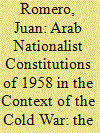

|
|
|
|
|
| Summary/Abstract |
Unlike many works on constitutions, this article focuses on non-legal aspects of the framing of Arab constitutions. This emphasis on the social and political in lieu of purely legal aspects of constitution-making allows us to place constitutions in a wider regional and not merely national context, and interpret them from a not strictly legal perspective. By adopting such an approach, historians can explain the extent to which the turbulence in the Arab world in the 1950s as a result of Arab nationalism, the creation of the state of Israel, the rivalry between revolutionary and monarchic Arab regimes, and the Cold War affected three Arab organic laws in the revolutionary year of 1958. This focus on contemporary social and political developments enables scholars to explain why the three different fundamental laws examined here reflect three different interpretations of Arab nationalism.
|
|
|
|
|
|
|
|
|
|
|
|
|
|
|
|
| 2 |
ID:
110335
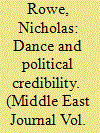

|
|
|
|
|
| Publication |
2011.
|
| Summary/Abstract |
This article examines how the rural folkdance dabkeh has, in the last century, been appropriated and reinvented as a tradition in order to construct the imagined communities of Zionism, pan-Arabism, and Palestinian Nationalism within Palestine/Israel. This appropriation has led to extensive debates and suppositions on the source, meanings, and cultural ownership of dabkeh. The following historical narratives, emerging from interviews with dance practitioners and dance advocates in the West Bank, Israel, and Lebanon, and from literature in libraries and archives in the West Bank, Israel, and Great Britain, draw attention to the salient links between dance and politics and the multiple ways in which collective identities can be constructed and deconstructed. These histories further raise questions about how local cultural autonomy and sustainability within the Occupied Palestinian Territories have been affected by the process of political appropriation.
|
|
|
|
|
|
|
|
|
|
|
|
|
|
|
|
| 3 |
ID:
104156


|
|
|
|
|
| Publication |
2011.
|
| Summary/Abstract |
After his premature death in exile in Beirut in 1937, the body of former Iraqi prime minister Yasin al-Hashimi became a matter of contention between the Syrian and Iraqi governments, as did his legacy as an avid Pan-Arabist. When the coffin with the deceased stopped in Damascus on its promised transfer to Baghdad, the Syrian National Bloc government used the opportunity to stage a solemn republican funeral to bolster its Arab nationalist credentials. Syrian conflicts with the Iraqi government that had removed al-Hashimi in a military coup in the previous year ultimately made Yasin's return impossible, however, and he was buried in Damascus, next to Saladin's mausoleum at the Umayyad Mosque. Unfortunately for the National Bloc, the funeral coincided with the first clashes over the Alexandretta crisis. The resulting street protests destroyed all public confidence that the bloc had gained during the funeral, underlining the volatile nature of nationalist politics at the time.
|
|
|
|
|
|
|
|
|
|
|
|
|
|
|
|
| 4 |
ID:
174160
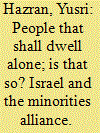

|
|
|
|
|
| Summary/Abstract |
The state of Israel, and the Zionist movement before it, has always considered itself to be facing an existential threat from hostile surroundings. Hence, seeking alliance with non-Arab nations and ethnic minority groups in the area was seen as a means of confronting this challenge. During the early decades of its existence, the Israeli establishment adopted the concept of the alliance of the periphery and the alliance of minorities developed by Israel’s first prime minister, David Ben-Gurion and his protégée, Reuven Shiloah, the founder of the Israeli intelligence service, the Mossad. This research project will demonstrate that, in opposition to apologetic and ideologically-motivated arguments that deny that alliance with minority communities has been a systematic policy, the minorities’ alliance has for decades been an important foundation of Israeli strategy vis-à-vis the Arab world. Furthermore, the article will argue and demonstrate that the ‘Minorities Alliance’ is derived from ideological, historical, and strategic considerations anchored in the very existence of Zionism and Israel. Furthermore, and on the same note, this conception and strategy cannot be disconnected from the self-perception of Zionism, its self-directed reading of Jewish history, and the Zionisation of the milieu.
|
|
|
|
|
|
|
|
|
|
|
|
|
|
|
|
| 5 |
ID:
171871
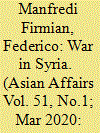

|
|
|
|
|
| Summary/Abstract |
Many existing studies on the war in Syria offer important insights but none fully engages the longue durée of history and its implications. Syria like many other states in Asia was established and institutionalized in the context of the growth and expansion of a capitalist world economy centred in Europe. The Franco-British reorganization of the Levant between the two world wars was supposed to support long-term processes of wealth accumulation and economic growth but forceful integration in the world economy set the stage instead for nationalist backlashes, economic crises, and war. Indeed, one of the driving forces of conflict in Syria as well as in other parts of the developing world has been the recurrence of struggles between those pushing for ever greater capitalist integration and those resisting such efforts in the name of alternative ideologies, including communism, Pan-Arab nationalism, and various distinct currents of political Islam. To demonstrate these dynamics, this paper will present a sweeping overview of the history of Syria and of the greater region, from Ottoman times to the present. It will also examine in detail the war that broke out in Syria in 2011, highlighting how it relates to broader struggles unfolding across the immediate region and beyond.
|
|
|
|
|
|
|
|
|
|
|
|
|
|
|
|
| 6 |
ID:
104866
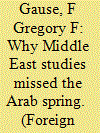

|
|
|
|
|
|
|
|